You searched for: world war I
<< Previous | Displaying results 326-350 of 533 for "world war I" | Next >>
-
Killing Centers: An Overview
ArticleThe Nazis established killing centers in German-occupied Europe during WWII. They built these killing centers for the mass murder of human beings.
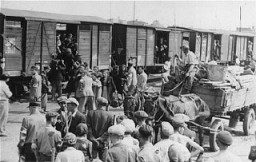
-
Vilna
ArticleDuring the Holocaust, the creation of ghettos was a key step in the Nazi process of ultimately destroying Europe's Jews. Learn about the Vilna ghetto.
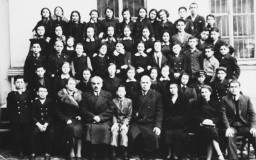
-
Locating the Victims
ArticleThe Germans and their collaborators used paper records and local knowledge to identify Jews to be rounded up or killed during the Holocaust.
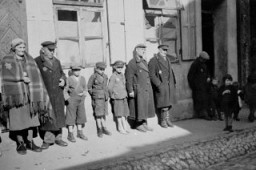
-
Kurt Klein describes some of the difficulties involved in emigrating from Germany
Oral HistoryAs Nazi anti-Jewish policy intensified, Kurt's family decided to leave Germany. Kurt left for the United States in 1937, but his parents were unable to leave before the outbreak of World War II. Kurt's parents were eventually deported to Auschwitz, in German-occupied Poland. In 1942, Kurt joined the United States Army and was trained in military intelligence. In Europe, he interrogated prisoners of war. In May 1945, he took part in the surrender of a village in Czechoslovakia and returned the next day to…
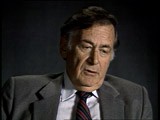
-
Victims of the Nazi Era: Nazi Racial Ideology
ArticleThe Nazis carried out genocide against Europe’s Jews and persecuted and murdered other groups based on racial theories. Learn about the history of these murderous ideas.
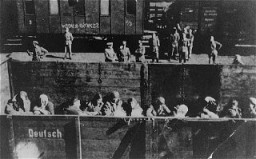
-
Aron (Dereczynski) Derman describes partisan activities near Vilna
Oral HistoryAron was born to a middle-class Jewish family in Slonim, a part of Poland between the two world wars. His parents owned a clothing store. After studying in a technical school, Aron worked as a motion-picture projectionist in a small town near Slonim. The Soviet army took over Slonim in September 1939. War broke out between Germany and the Soviet Union in June 1941. Aron returned to Slonim. The Germans soon occupied Slonim, and later forced the Jews into a ghetto. Aron was forced to work in an armaments…
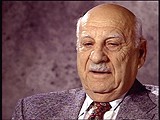
-
Belle Mayer Zeck describes difficult working conditions during the Nuremberg trials
Oral HistoryBelle Mayer trained as a lawyer and worked for the General Counsel of the US Treasury, Foreign Funds Control Bureau. This bureau worked to enforce the Trading With the Enemy Act passed by Congress. In this capacity, Mayer became familiar with the German I. G. Farben chemical company, a large conglomerate that used forced labor during World War II. In 1945, Mayer was sent as a Department of Treasury representative to the postwar London Conference. She was present as representatives from the Allied nations…
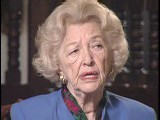
-
The Nazi Olympics Berlin 1936
ArticleThe 1936 Olympics in Berlin under Adolf Hitler's Nazi dictatorship were more than just a worldwide sporting event, they were also a show of Nazi propaganda.
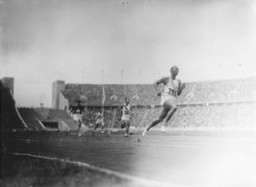
-
Genocide of European Roma (Gypsies), 1939–1945
ArticleLearn about the history of discrimination against Roma in Europe and how the Nazi regime committed genocide against European Roma during WWII.
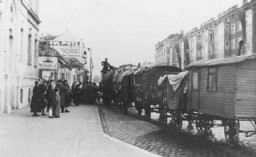
-
"The Nazi Plan": Annihilation of Jews
FilmThe film "The Nazi Plan" was shown as evidence at the International Military Tribunal in Nuremberg on December 11, 1945. It was compiled for the trial by Budd Schulberg and other US military personnel, under the supervision of Navy Commander James Donovan. The compilers used only German source material, including official newsreels. This footage titled "Hitler Predicts Annihilation of the Jewish Race in Europe if War Occurs" shows Hitler delivering a speech to the German parliament on January 30, 1939.
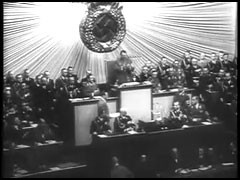
-
Poster: "We Women Are Voting Slate 2 National Socialists."
PhotoPoster: "We Women Are Voting Slate 2 National Socialists." German women were an important voting bloc. The Nazis made a concerted effort to appeal to women, as exemplified by this 1932 election poster. The Nazis had to repackage their messages to de-emphasize military aims. Hitler consciously modeled some Nazi propaganda appeals to German women on speeches delivered by Benito Mussolini in Fascist Italy, who also had to calm the fears of Italian war widows after World War I. Nazi propagandists attempted to…
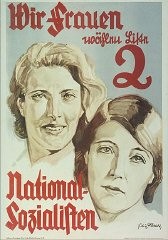
-
Nazi Imperialism: An Overview
ArticleThe Nazis pursued the imperialist concept of Lebensraum (living space) as they conquered eastern Europe. Read more about the deadly consequences of Nazi imperialism.
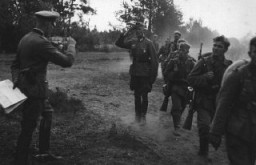
-
Zeilsheim Displaced Persons Camp
ArticleAfter WWII, many Holocaust survivors, unable to return to their homes, lived in displaced persons camps in Germany, Austria, and Italy. Read about Zeilsheim DP camp.
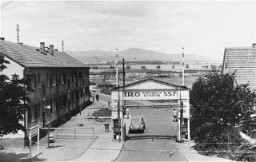
-
Aron (Dereczynski) Derman describes escape from a train during deportation from Grodno in 1943
Oral HistoryAron was born to a middle-class Jewish family in Slonim, a part of Poland between the two world wars. His parents owned a clothing store. After studying in a technical school, Aron worked as a motion-picture projectionist in a small town near Slonim. The Soviet army took over Slonim in September 1939. War broke out between Germany and the Soviet Union in June 1941. Aron returned to Slonim. The Germans soon occupied Slonim, and later forced the Jews into a ghetto. Aron was forced to work in an armaments…
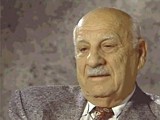
-
Quakers
ArticleThe American Friends Service Committee, a Quaker relief organization, helped thousands of people before, during, and after World War II. Learn about its refugee aid work.
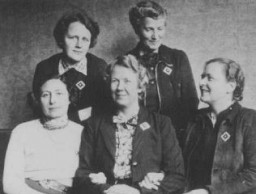
-
Max Karl Liebmann describes arrival at and conditions in the Gurs camp
Oral HistoryBecause he was Jewish, Max could not join the army when World War II began. Instead, he had to perform labor service. In October 1940, Max and his mother were deported to the Gurs camp in France. In Gurs, Max met his future wife, Hanne. In 1941, with the help of the Children's Aid Society (Oeuvre de Secours aux Enfants; OSE), Hanne left the camp. Max followed in July 1942. He escaped to Switzerland through the French Alps and was in internment and refugee camps throughout the war. Hanne reached Switzerland…
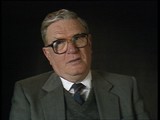
-
Moishe Menyuk
ID CardMoishe was born to a Jewish family in the village of Komarovo, which until 1918 was part of the Russian Empire. At 18, he was drafted into the Russian army and fought in World War I. He was captured by the Germans, and while a POW, learned German. After the war he returned to Komarovo, which by then was part of Poland. He supported his family by farming and managing an estate for a Pole from Warsaw. 1933-39: The few Jews of Komarovo got along well with the Ukrainians. Moishe even played the fiddle at…
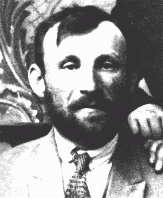
-
Belle Mayer Zeck reflects upon people who have dedicated their lives to the cause of human rights
Oral HistoryBelle Mayer trained as a lawyer and worked for the General Counsel of the US Treasury, Foreign Funds Control Bureau. This bureau worked to enforce the Trading With the Enemy Act passed by Congress. In this capacity, Mayer became familiar with the German I. G. Farben chemical company, a large conglomerate that used slave labor during World War II. In 1945, Mayer was sent as a Department of Treasury representative to the postwar London Conference. She was present as representatives from the Allied nations…
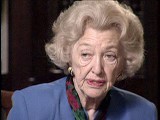
-
Book Burning
ArticleBook burning is the ritual destruction by fire of books or other written materials. The Nazi burning of books in May 1933 is perhaps the most famous in history. Learn more.
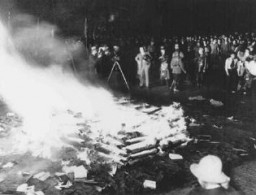
-
Charlene Schiff describes children smuggling food into the Horochow ghetto
Oral HistoryBoth of Charlene's parents were local Jewish community leaders, and the family was active in community life. Charlene's father was a professor of philosophy at the State University of Lvov. World War II began with the German invasion of Poland on September 1, 1939. Charlene's town was in the part of eastern Poland occupied by the Soviet Union under the German-Soviet Pact of August 1939. Under the Soviet occupation, the family remained in its home and Charlene's father continued to teach. The Germans…
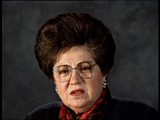
-
The United States and the Refugee Crisis, 1938–41
ArticleNazi Germany’s territorial expansion and the radicalization of Nazi anti-Jewish policies triggered a mass exodus. Learn about the US and the refugee crisis of 1938–41.
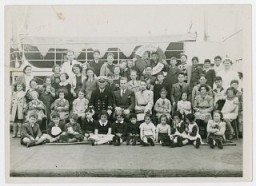
-
Decree against Public Enemies
ArticleThe Decree against Public Enemies was a key step in the process by which the Nazi leadership moved Germany from a democracy to a dictatorship.
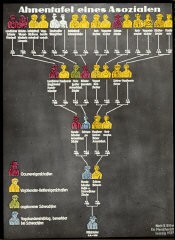
-
“Give Me Your Children”: Voices from the Lodz Ghetto
ArticleThe Jewish children of Lodz suffered harsh conditions after the German invasion of Poland. Read excerpts from diaries where they recorded their experiences.
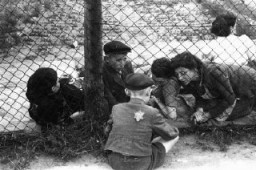
-
Historian Peter Black describes the potential of legal consequences
Oral HistoryIn the 1980s and 1990s, historian Peter Black worked for the US Department of Justice Office of Special Investigations, as part of a team tracking and prosecuting suspected war criminals. Black later served as the Senior Historian at the United States Holocaust Memorial Museum.
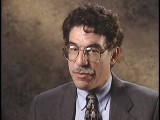
-
Kurt Gerstein
ArticleSS officer Kurt Gerstein was horrified by what he witnessed at the Belzec killing center. Learn about how he recorded what he witnessed and about his postwar fate.
